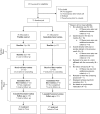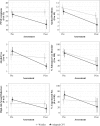Randomized Control Trial of Culturally Adapted Cognitive Processing Therapy for PTSD Substance Misuse and HIV Sexual Risk Behavior for Native American Women
- PMID: 30607757
- PMCID: PMC6407746
- DOI: 10.1007/s10461-018-02382-8
Randomized Control Trial of Culturally Adapted Cognitive Processing Therapy for PTSD Substance Misuse and HIV Sexual Risk Behavior for Native American Women
Abstract
An overlooked sequela of HIV risk is trauma exposure, yet few HIV interventions address trauma exposure, mental health, and substance misuse. In a two-arm randomized controlled trial 73 Native American women were randomized to a culturally-adapted Cognitive Processing Therapy (CPT) or 6-weeks waitlist. Outcomes assessed: PTSD symptom severity, alcohol use frequency, substance abuse or dependence diagnosis, and high-risk sexual behavior defined as vaginal/anal intercourse (a) under the influence of alcohol and/or illicit substances, (b) with a partner who was concurrently sexually active with someone else, and/or (c) with more than one partner in the past 6 weeks. Among immediate intervention participants, compared to waitlist participants, there were large reductions in PTSD symptom severity, high-risk sexual behavior, and a medium-to-large reduction in the frequency of alcohol use. CPT appears to improve mental health and risk behaviors, suggesting that addressing PTSD may be one way of improving HIV-risk related outcomes.
Una secuela pasada por alto acerca del riesgo de VIH es la exposición a trauma, sin embargo, pocas intervenciones del VIH abordan la exposición de trauma, la salud mental y el abuso de sustancias. En un ensayo controlado aleatorio de dos brazos, 73 mujeres nativas americanas fueron asignadas al azar a una Terapia de Procesamiento Cognitivo (TPC) adaptada culturalmente o a 6 semanas de espera. Resultados evaluados: Severidad de los síntomas de trastorno de estrés post-traumático (TEPT), frecuencia del consumo de alcohol, diagnóstico de abuso o dependencia de sustancias, y conducta sexual de alto riesgo definida como coito anal/vaginal a) bajo la influencia del alcohol y/o sustancias ilícitas, b) con una persona que tuvo relaciones sexuales concurrente con otras personas y/o c) con más de una persona en las últimas 6 semanas. Entre los participantes en la condición inmediata versus participantes en la lista de espera, hubo una gran reducción en la gravedad de los síntomas del TEPT, y reducción de conducta sexual de alto riesgo. Además, y una mediana a grande reducción en la frecuencia del consumo de alcohol. La TPC parece mejorar la salud mental y reducer las conductas de riesgo, lo que sugiere que tratar el TEPT puede ser una forma de mejorar las conductas relacionadas con el riesgo de VIH.
Keywords: American Indian and Alaska native; Cognitive processing therapy; HIV/AIDS; PTSD; Substance misuse.
Conflict of interest statement
Conflicts of interest
The authors declare that they have no conflict of interest.
Ethical Approval
All procedures performed in this study involving human participants were in accordance with the ethical standards of the institutional research committee and with the 1964 Helsinki declaration and its later amendments or comparable ethical standards. No animals were involved.
Informed Consent
Informed consent was obtained from all individual participants included in the study.
Figures
References
-
- Brief DJ, Bollinger AR, Vielhauer MJ, Berger-Greenstein JA, Morgan EE, Brady SM, et al. Understanding the interface of HIV, trauma, post-traumatic stress disorder, and substance use and its implications for health outcomes. AIDS Care. 2004;16(Suppl 1):S97–S120. - PubMed
-
- Boarts J, Buckley-Fischer B, Armelie A, Bogart L, Delahanty D. The impact of HIV diagnosis-related vs. non-diagnosis related trauma on PTSD, depression, medication adherence, and HIV disease markers. J Evid Based Soc Work. 2009;6:4–16. - PubMed
-
- Leserman J, Whetten K, Lowe K, Stangl D, Swartz MS. How trauma, recent stressful events and PTSD affect functional health status and health utilization in HIV-infected patients in the south. Psychosom Med. 2005;67:500–507. - PubMed
Publication types
MeSH terms
Grants and funding
LinkOut - more resources
Full Text Sources
Medical
Miscellaneous



